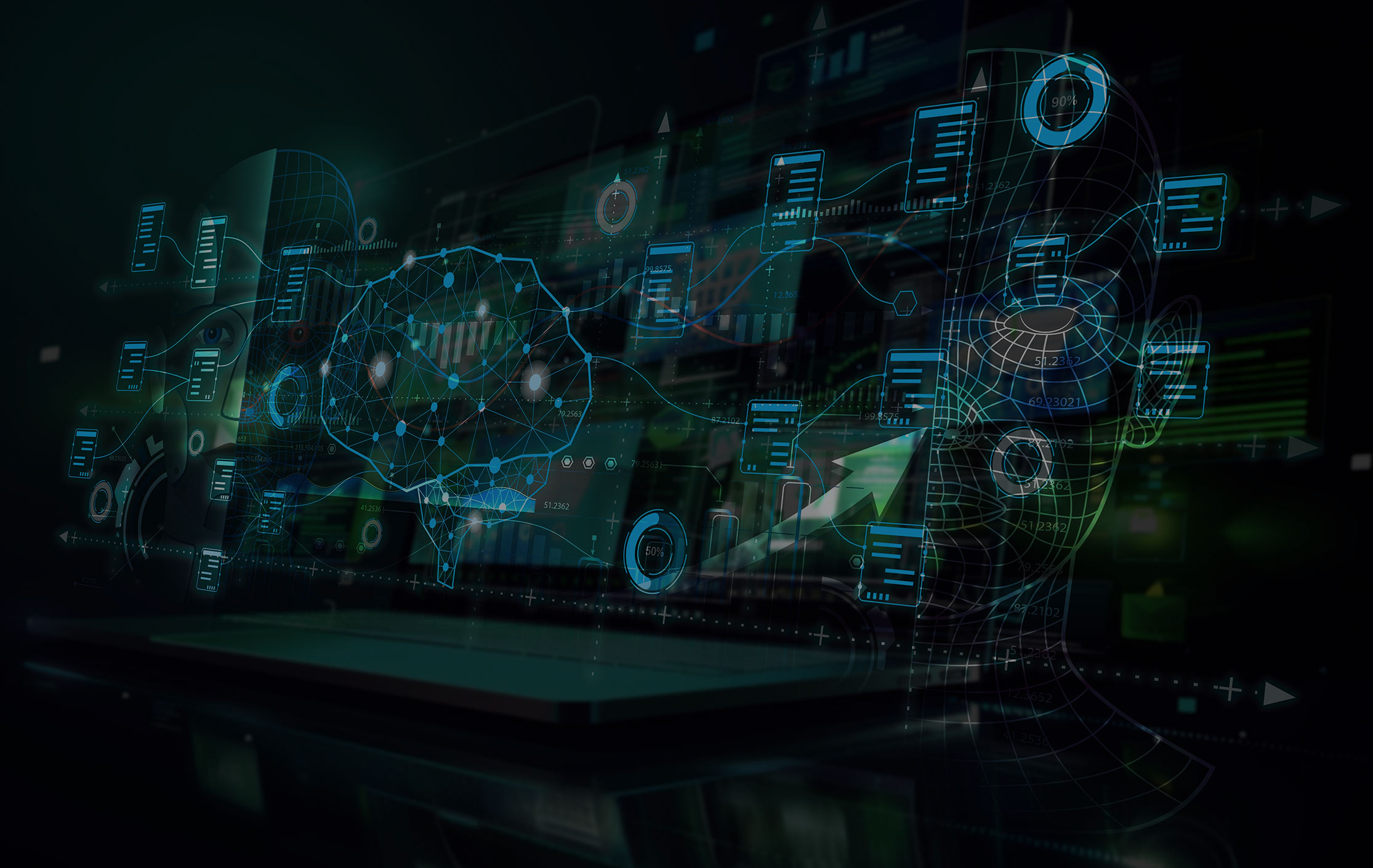Artificial intelligence (AI) is rapidly becoming a transformative force, poised to revolutionise industries and redefine technological innovation. 2025 is a pivotal year for AI advancements, making it crucial to understand the key trends, opportunities, and challenges ahead. This document explores these projected advancements, their anticipated impact across various sectors, and the associated benefits and risks.
Projected Advancements in AI for 2025 – What Awaits Us?
The AI market is experiencing explosive growth, projected to expand annually by 36.6% between 2024 and 2030, making it a major driver of global economic growth. This growth is fueled by increasing AI adoption, with 55% of companies already using AI and 45% actively exploring its implementation. However, some commentary suggests a potential shift towards efficiency and specialised AI solutions, leading to more focused, targeted applications.
Key Trends Shaping the AI Landscape:
- Collaborative AI Systems: The Power of Teamwork: Experts at the Stanford Institute for Human-Centered AI predict the rise of specialised AI agents working together under human supervision. These “AI teams” are expected to tackle complex problems in healthcare (assisting with administrative tasks like nurse handoffs and freeing staff for patient care), education (multimodal AI processing speech and images to personalise learning), and finance. This shift emphasises the evolving human role: providing high-level guidance and focusing on creativity and critical thinking.
- More Autonomous AI Agents: Taking on Greater Responsibility: AI-powered agents are predicted to become more capable and autonomous, handling more complex activities and even making decisions. This will transform business processes. For example, nearly 70% of Fortune 500 companies already use Microsoft 365 Copilot for email management and note-taking. In 2025, these agents will evolve to handle more complex tasks with greater autonomy.
- Enhanced Personalisation: Tailored Experiences Across Industries: AI will drive greater personalisation in retail (customer experiences, supply chains), finance (risk management, fraud detection), and healthcare (personalised care, diagnostics), driven by increasing data availability and more sophisticated AI models.
- AI and Sustainability: Tech for a Greener Future: AI is predicted to address sustainability challenges significantly. In agriculture, AI-powered robots can clean fields and remove pests, reducing the need for harmful pesticides and herbicides. AI can also optimise urban planning for autonomous vehicles and improve traffic management, contributing to long-term solutions for reducing carbon emissions and storing carbon.
- AI-Enhanced Security: Strengthening Digital Defenses: In 2025, AI will bolster cybersecurity by identifying and combating threats, automating security tasks, and accelerating response times. Financial institutions can use AI to detect counterfeit documents; manufacturers can use it to protect data and identify potential risks. AI will also be used to combat deepfakes and misinformation. However, this also leads to an “arms race” as adversaries leverage AI for more sophisticated attacks.
- Edge Computing and Robotics: AI in the Physical World: Edge computing (processing AI algorithms closer to the data source, reducing latency) and robotics (combining AI with physical robots) are leading new AI innovations. These advancements will significantly impact manufacturing, healthcare, and logistics, enabling real-time applications and automation.
- AI vs. Automation: Understanding the Difference: It’s important to distinguish between AI and automation. While automation focuses on streamlining processes and improving productivity, AI offers more complex capabilities like decision-making and advanced content analysis, learning from data, adapting, and making decisions with increasing autonomy.
- Quantum AI: A Glimpse into the Future: Quantum AI, combining quantum computing with AI algorithms, is an emerging field with the potential to revolutionise AI development by solving complex problems beyond classical computers’ capabilities.
- Next-Generation Voice Assistants and Generative Video: Enhancing Human-Computer Interaction: Next-generation voice assistants will emerge in 2025, with advancements in natural language understanding and personalised responses. Generative video, where AI creates realistic video content, will also likely gain momentum, opening new possibilities for entertainment, marketing, and education.
Expected Impact of AI Across Various Sectors in 2025:
AI is poised to transform industry-level competitive landscapes:
- Consumer Markets: Personalised customer experiences and optimised marketing strategies.
- Financial Services: Automation, improved risk management, and enhanced customer service by both AI-native startups and large institutions.
- Healthcare: Accelerated use of AI due to a more flexible regulatory environment, leading to advancements in diagnostics, treatment, and drug discovery.
- Industrial Products: Optimised manufacturing processes, improved supply chain efficiency, and enhanced product design.
- Technology: Continued leadership in AI innovation and new technologies and applications development.
Let’s Dive into Key Sectors:
- Healthcare: AI will revolutionise healthcare in 2025. AI-assisted image analysis will reimagine screening and early detection. AI health concierges will offer personalised recommendations, multilingual support, medication reminders, and care navigation. AI will also enhance access to healthcare, particularly in underserved communities, improve diagnostics in rare disease cases, and integrate with XR technologies for more nuanced medical interactions. The projected growth of AI applications in cancer diagnostics is substantial, with a compound annual growth rate (CAGR) of 40.1% from 2021 to 2028.
- Drug Discovery: AI is expected to accelerate the drug discovery process, streamlining operations, reducing timelines and costs, and improving the likelihood of successful clinical trials. AI can potentially reduce trial costs by up to 70% and shorten timelines by as much as 80%.
- Medical Imaging: AI will continue transforming medical imaging, improving diagnostic accuracy, enabling early disease detection, and using generative models to create synthetic datasets.
- Personalised Medicine: AI will drive personalised medicine by analysing patient data to tailor treatment plans, optimise drug dosages and timing, and even create digital twins for treatment simulations. In oncology, AI can optimise drug dosing and identify promising treatment combinations.
- Education: AI is expected to personalise learning experiences through multimodal AI and assist teachers in providing personalised feedback.
- Finance: AI will transform finance through automated risk management, enhanced fraud detection, and personalised customer service. Expect mandatory explainable AI in lending decisions to prevent biases.
- Public Sector: AI will deliver cost savings and improve citizen services through enhanced decision-making, policy implementation, and service delivery.
Other Key AI Trends in 2025:
- AI-Native Applications: These applications, specifically designed to leverage AI capabilities, are expected to see increased funding and market value.
- AI Exits: The trend of AI company acquisitions, primarily through Mergers and Acquisitions (M&A), is expected to continue, indicating market consolidation.
- Outcome-Based AI Pricing Models: The adoption of these models, which tie pricing to the value generated by AI, is expected to be slow initially due to challenges in measuring and quantifying AI’s impact.
- Real-Time Automated Decision-Making: The use of AI for real-time decision-making is increasing in sectors like finance and transportation, highlighting the growing reliance on AI for critical, time-sensitive processes.
- Responsible AI Development: There’s a growing emphasis on ethical considerations, bias mitigation, and transparency in AI development, reflecting awareness of potential risks and ethical implications.
Potential Benefits and Risks Associated with AI Advancements in 2025:
Benefits:
- Increased Efficiency and Productivity: AI can automate tasks, streamline processes, and improve productivity across sectors. For example, 25% of the code generated at Google is now written by AI.
- Enhanced Decision-Making: AI can analyse vast datasets to provide insights and support better decision-making.
- Improved Customer Experiences: AI can personalise interactions and create more engaging experiences.
- Accelerated Innovation: AI can drive innovation across fields, leading to new discoveries and advancements.
- Improved Healthcare Outcomes: AI can enhance diagnostics, personalise treatments, and improve patient care.
Risks:
- Bias and Discrimination: AI systems can perpetuate existing biases if trained on biased data. Data governance (managing data collection, storage, and use) is crucial for ensuring fairness, accuracy, and transparency.
- Job Displacement: AI-powered automation may lead to job displacement in certain sectors.
- Security Threats: AI can be exploited for malicious purposes, such as creating deepfakes or launching cyberattacks. The potential weaponisation of AI raises serious ethical concerns. The emergence of deepfakes, automated cyberattacks, and AI-generated misinformation highlights the need for robust security and regulatory frameworks. Governments are increasingly concerned about the security of AI model weights and the theft or misuse of AI models.
- Privacy Violations: AI systems can collect and analyse vast amounts of personal data, raising privacy concerns, particularly with AI-powered surveillance systems.
- Lack of Transparency and Explainability: The complexity of some AI models makes it difficult to understand their decision-making processes. Transparency in AI relies on explainability, accountability, and fairness.
- Cybersecurity Challenges for AI Firms: AI-driven firms face cybersecurity challenges, including phishing and malware attacks. Minimising data storage can help protect against data breaches.
- Navigating a Post-Truth World: The increasing difficulty distinguishing real from AI-generated content raises ethical concerns and potential societal impact.
Addressing these risks through responsible AI development and appropriate regulations is crucial.
AI-Related Conferences and Events in 2025:
Several AI-related conferences and events are planned to share knowledge and discussion opportunities. Some notable events include:
- 39th Annual AAAI Conference on Artificial Intelligence (Philadelphia, PA, USA, February 25 – March 4, 2025)
- AI DevWorld 2025 (In-Person & Live Online, February 11 – 20, 2025)
- IEEE Conference on Artificial Intelligence (IEEE CAI) (Santa Clara, CA, USA, May 5-7, 2025)
- NVIDIA GTC (San Jose, CA & Virtual, March 17–21, 2025)
- Data + AI Summit (San Francisco, CA USA, June 9-12, 2025)
- International Summer School on Artificial Intelligence and Games (Malmö, Sweden, June 23-27, 2025)
- MIT EmTech AI (Boston, MA, USA, May 2025)
These events cover a wide range of topics, including AI research, applications, ethics, and policy.
Government Policies and Regulations Expected in 2025:
Government Policies:
- Increased Federal Funding for AI: The US Senate is considering boosting federal funding for AI research and education to $32 billion annually. Congress is also expected to increase federal investment and impose more restrictive export controls on AI technologies.
- Comprehensive Federal Data Privacy Law: The US Senate is considering a comprehensive federal data privacy law to address data protection concerns related to AI.
- AI-Generated Content in Elections: A bill was introduced in March 2024 to protect Americans from AI-generated content during elections by setting standards for identifying such content.
State-Level Regulations:
- Continued AI Legislation: States are expected to continue pursuing AI legislation. Almost 700 legislative proposals were considered in 2024, with 45 states taking up AI-related legislation. These regulations may address deepfakes, digital replicas, generative AI, synthetic content labelling, and high-risk AI systems.
- Colorado AI Act: Colorado enacted the first comprehensive US AI legislation in May 2024, creating duties for developers and those who deploy AI.
- California AI Bills: California enacted various AI bills in September 2024 relating to transparency, privacy, entertainment, election integrity, and government accountability.
- Public Safety Regulations for Large AI Models: State lawmakers are likely to pursue public safety regulations for large AI models.
- AI in Employment Decision-Making: Regulations are expected to address the use of AI in employment, such as the proposed Texas Regulatory Act on Artificial Intelligence in Government and the Economy (TRAIGA).
Regulatory Enforcement and Concerns:
- Continued regulatory enforcement of false representations about AI and new investigations into AI misuse.
- Emphasis on specific consumer harms driven by anecdotes.
- Significant cybersecurity concerns include data breaches, ransomware attacks, HIPAA violations, internal data privacy issues, and vulnerabilities in medical devices.
AI Governance and Policy Considerations:
- Continued debates on AI incident tracking, third-party auditing, content authenticity tools, data protection, safety cases, risk management, and liability for AI harms.
- The a crucial need for upgrading the AI literacy of policymakers, legislators, and regulators.
- The importance of improving governmental capacity to deliver services and articulate a public vision for AI.
- Increased investment in AI by the Department of Defense (DoD).
- The potential impact of AI on the clean energy transition.
- The role of AI in improving healthcare access.
- The potential of AI to address the climate crisis.
- The expected views of the Trump Administration on AI in the workplace.
- The expectation is that federal agencies, with the possible exception of the FCC, will refrain from issuing new AI regulations in 2025.
- The expectation is that Congress will not intervene in the copyright debate between publishers and AI companies in 2025.
UK AI Policy and Regulations Expected in 2025:
Here’s a look at what we might expect in 2025:
- National AI Strategy Implementation: The UK government’s National AI Strategy, launched in 2021, sets a ten-year vision to make the UK a global AI superpower. By 2025, we should see further implementation of this strategy, with a focus on:
- Skills and Talent: Continued investment in AI skills and training programs to develop a strong domestic AI workforce.
- Research and Development: Funding for AI research and innovation, including support for emerging technologies like quantum computing and AI.
- Data Access and Infrastructure: Initiatives to improve data access and infrastructure to support AI development and deployment.
- Adoption and Diffusion: Programs to encourage AI adoption across different sectors of the UK economy.
- AI Regulation and Governance: The UK takes a context-specific approach to AI regulation, focusing on specific sectors and applications rather than a single, overarching law. Key areas of focus include:
- The AI White Paper: The UK government published an AI White Paper outlining its approach to AI regulation. This emphasises principles-based regulation, focusing on safety, transparency, fairness, accountability, and contestability. By 2025, we can expect to see further development and implementation of these principles, potentially leading to more concrete guidance and sector-specific regulations.
- Digital Regulation Cooperation: The UK actively engages in international cooperation on AI regulation, working with partners like the US, EU, and other countries to promote interoperability and avoid regulatory fragmentation.
- Focus on High-Risk AI: Expect increased scrutiny and potential regulation of high-risk AI applications, such as those used in healthcare, criminal justice, and recruitment. The government will likely consult on specific definitions of “high-risk” and appropriate regulatory interventions.
- Information Commissioner’s Office (ICO) Guidance: The ICO is expected to continue providing guidance on data protection and AI, particularly concerning using personal data in AI systems. This includes advice on data minimisation, purpose limitation, and security.
- Online Safety Bill and AI: The Online Safety Bill, which aims to regulate online content, may also have implications for AI, particularly concerning the use of AI in content moderation and the spread of harmful online content.
- Pro-Innovation Approach: The UK is keen to maintain a pro-innovation environment for AI, balancing regulation with the desire to foster growth and investment in the sector. This means that regulations are likely to be designed to be flexible and adaptable to the rapidly evolving nature of AI.
Comparison with the US Approach:
While both the US and UK are grappling with AI governance, there are some key differences:
- Centralised vs. Sectoral Approach: The US approach is more fragmented, with different states and federal agencies taking different approaches. The UK is pursuing a more centralised, principles-based approach with sector-specific guidance.
- Emphasis on Innovation: Both countries recognise the importance of fostering AI innovation, but the UK has explicitly emphasised a pro-innovation approach in its regulatory strategy.
- International Cooperation: Both countries are engaged in international cooperation, but the UK has strongly emphasised working with global partners to ensure regulatory alignment.
In Conclusion:
2025 promises to be a year of significant advancements and challenges in AI. Collaborative AI systems, AI agents, and enhanced personalisation are expected to drive innovation and transform industries. AI will play a crucial role in addressing sustainability and strengthening cybersecurity. However, ethical concerns, potential biases, and the risk of job displacement require careful consideration.
The expected impact of AI across various sectors is substantial. AI has the potential to improve efficiency, enhance decision-making, and create more personalised experiences. However, addressing ethical and societal implications is crucial for responsible and beneficial implementation.
Government policies and regulations will play a critical role in shaping the future of AI. Increased federal funding, data privacy laws, and state-level regulations will influence AI development and deployment. Global collaboration will be essential to ensure AI benefits are widely shared, and risks are mitigated.
Overall, 2025 is a pivotal year for AI, with advancements that could reshape industries and redefine technological innovation. By understanding the key trends, opportunities, and challenges, we can navigate this transformative period and harness AI’s full potential for society’s benefit. Prioritising responsible AI development, addressing ethical concerns, and fostering a collaborative approach is essential to ensure that AI serves humanity reasonably, transparently, and beneficially.
Ultimately, AI is a strategic advantage. Leaders must adopt AI ethically, foster innovation, and empower their teams to collaborate with this technology. Organisations that align AI with their values, drive sustainable growth, and re-skill their workforce will thrive and shape their industries’ future.




